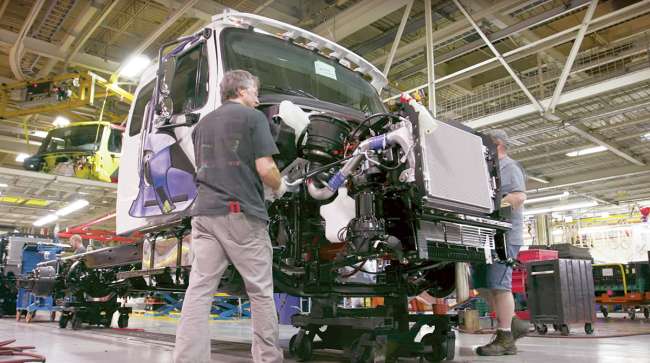Staff Reporter
DTNA Executive Says Flexibility Is Key for Coming Upturn

[Stay on top of transportation news: Get TTNews in your inbox.]
Truck makers and their suppliers must be more flexible than ever as a turnaround in the U.S. for-hire freight environment continues to slip, according to a senior Daimler Truck North America executive.
“We have a massive chess board,” said DTNA Senior Vice President of Sales and Marketing David Carson, and his company is trying to move all the pieces around while waiting for freight rates to rise and equipment purchases to pick up.
Speaking at the 2024 FTR Transportation Conference in Indianapolis on Sept. 9, Carson said demand has moderated for Class 8 on-highway trucks, or supply has caught up, but either way the rebalancing was expected.
Balance is key, said Carson, because truck manufacturers do not want to be caught short — leaving customers waiting for in-demand rolling stock — as they were in the pandemic, should demand for trucks revive.

Carson
Truck makers also do not want to lay off employees, he said, due to the cost and timing problems faced in rehiring. It is even more difficult for truck makers’ suppliers, he added.
The key, he said, is ensuring suppliers receive the right signals in enough time to make adequate planning decisions. “We try to be as transparent as possible,” Carson said. “If we have dips, we don’t want them to take shifts offline. We want to be closer to them.”
While supply chain problems have eased for North American truck makers, including the parent company of Class 8 truck brands Freightliner and Western Star, lingering concerns remain, particularly after a key mirror supplier for several players shuttered a plant in Mexico following a fire.
RELATED: Trailer Demand Prospects Dim Further as FTR Cuts Forecast
“Parts were a massive issue during COVID. We’re over that now,” Carson said. “We don’t take that for granted though.”
DTNA is ensuring it retains adequate parts inventory at plants, dealerships and distribution centers because once the supply chain falls behind customers’ requirements, it is too late to begin swimming upstream, he said.
Transtex CEO Mathieu Boivin discusses the environmental sustainability of auxiliary power units. Tune in above or by going to RoadSigns.ttnews.com.
In particular, truck makers are keeping an eye on chip suppliers.
“We don’t have a chip issue,” as was the case in the pandemic, Carson said. “What we might have at the moment is a focus issue.” Chip makers are chasing the most profitable options, which at this time are high-end artificial intelligence-focused chips, he explained.
Even with the mirror problem, North America has been a bright spot for Daimler Truck so far in 2024, with production hitting all targets, particularly for vocational trucks.
The last eight months or so have seen trucks delivered earlier than customers expected, Carson said.

Daum
“We are fully prepared to go full steam throughout the entire year,” Chief Executive Martin Daum said when the parent company issued its first-quarter 2024 results.
But as a result, inventories have built up, even as sales across the industry have fallen, especially in the on-highway segment. Industrywide inventories reached 86,100 in July, an increase of 4% month on month and jump of 48% year on year, FTR Transportation Intelligence Senior Analyst – Commercial Vehicles Dan Moyer told the conference.
Even so, if customers hold off on placing orders should the weak freight environment persist, there may not be enough trucks, particularly as the introduction of new Environmental Protection Agency nitrogen oxide emissions regulations approaches, said Carson.
“If customers back off 50% in 2024 and do the same in 2025, and then come back in 2026 and say I need 130% of my 2024 allocation, then there’s going to be a lot of disappointed customers,” he said.
If demand for 2025 is shuffled back to the second half of the year, there may be tweaks to build slots, particularly for vocational trucks, he added.
Daimler Truck still expects to sell 180,000 to 200,000 vehicles in North America in 2024, the company said when releasing its second-quarter results. The company cut its forecast for European and Asian sales.
Want more news? Listen to today's daily briefing below or go here for more info:





